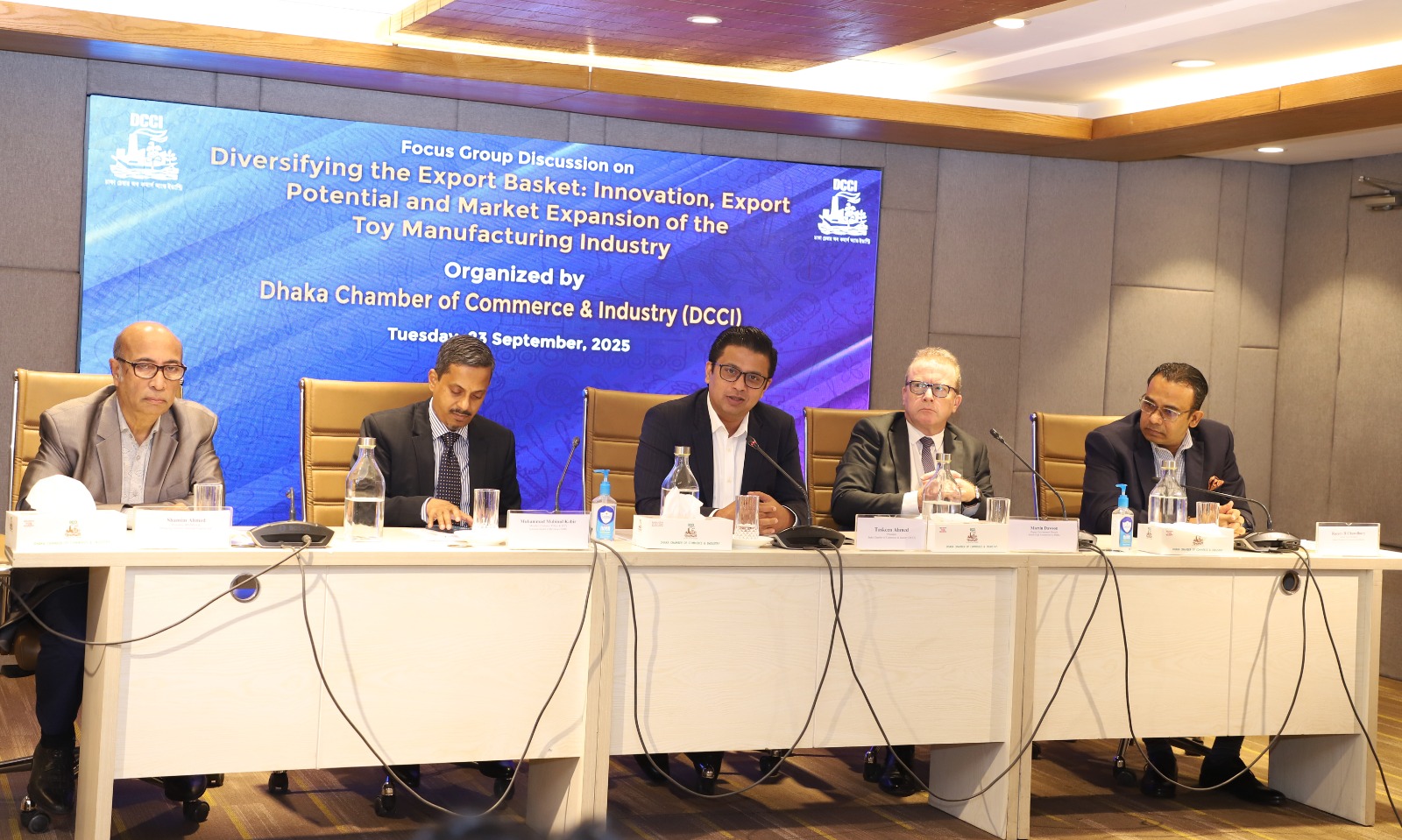News Flash
News Flash

DHAKA, Sept 23, 2025 (BSS) - Experts at a discussion today laid emphasis on a
specific policy framework for utilizing the immense potential of the
country's toy industry.
They observed that due to lack of necessary policy support, high tariffs on
raw material imports, absence of bonded facilities, inadequate
infrastructure, insufficient testing facilities, the potential of this sector
remains largely untapped.
They made the observation at the discussion on "Diversifying the Export
Basket: Innovation, Export Potential and Market Expansion of the Toy
Manufacturing Industry" held at the Dhaka Chamber of Commerce and Industry
(DCCI) in the city.
As a special guest, Muhammad Mubinul Kabir, member (Customs: Policy & ICT),
National Board of Revenue (NBR), said that in order to survive in the post-
LDC era, the government needs to focus on other potential sectors alongside
the RMG sector.
"To diversify our export basket, NBR has been working to simplify policies
and extend bonded facilities to the businesses of other potential sectors,"
he noted.
Mubinul Kabir mentioned that the revenue department imposes tariffs in
accordance with the Tariff Policy formulated in 2023 and the revenue
authority aligns its strategies with the recommendations provided by donor
agencies to enhance efficiency and strengthen overall capacity.
There is limited scope for mid-year policy changes, but during the next
budget formulation, the government may consider providing necessary policy
support to this sector, he added.
He remarked that although the RMG sector has received policy support for the
last 40 years, it is time to rethink its overall capacity; hence toy
entrepreneurs should focus more on enhancing their own skills, innovation,
and product development rather than solely relying on government incentives.
Martin Dawson, deputy development director of the British High Commission to
Dhaka, said Bangladeshi toys have immense export potential, and the UK
government is keen to cooperate in this regard.
If the existing policy barriers are addressed, exports to the UK could
multiply significantly, he hoped.
He informed that the UK government recently initiated simplification of Rules
of Origin requirements, which will help Bangladeshi entrepreneurs expand
their exports to the UK.
Martin also mentioned that NBR has already simplified customs clearance for
industrial raw materials and removed certain bottlenecks, which will
contribute to overall export growth of Bangladesh.
In his welcome remarks, DCCI President Taskeen Ahmed said although the global
toy market exceeds US$100 billion, Bangladesh's export stands at only $77
million.
"Due to lack of necessary policy support, high tariffs on raw material
imports, absence of bonded facilities, inadequate infrastructure,
insufficient testing facilities, the potential of this sector remains largely
untapped," he added.
To utilize the immense potential of this growing sector, he stressed on more
involvement of the education sector in innovation and enhanced coordination
among government agencies.
The keynote paper was presented by Shamim Ahmed, president of BPGMEA and
Managing Director (MD) of Jalalabad Polymer Industries.
He said, in his keynote paper, there are about 5,000 enterprises in the
plastic sector in Bangladesh, of which around 250 are engaged in toy
manufacturing, employing about 1.5 million people.
Export from this sector reached $276 million in FY 2023-24 while the domestic
market is worth nearly Taka 400 billion, the BPGMEA head added.
In FY 2016-17, toy exports were $15.23 million, which increased to $77
million in FY 2022-23 through exports to 88 countries, he mentioned.
However, he said, lack of product quality assurance, inadequate
infrastructure, absence of research, and lagging behind in innovative design
development are major hurdles to growth.
For the overall development of this sector, he stressed on cluster
development, human resource training for innovation, encouraging joint
venture investment, infrastructural development, formulation of toy-specific
policies under the existing plastic industry policy, and reducing
supplementary duties on necessary machinery.
DCCI Senior Vice-President Razeev H Chowdhury, Vice-President Md. Salem
Sulaiman, members of the Board of Directors, and industry representatives
were present on the occasion.